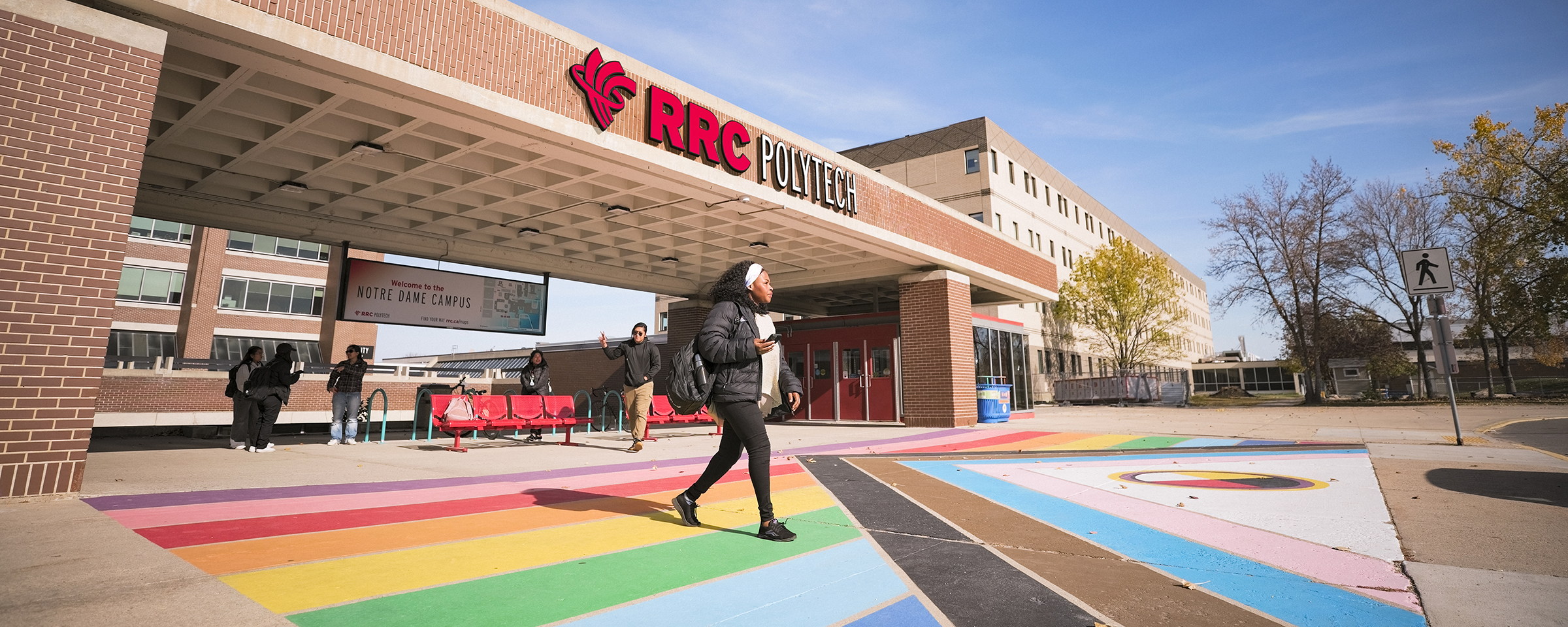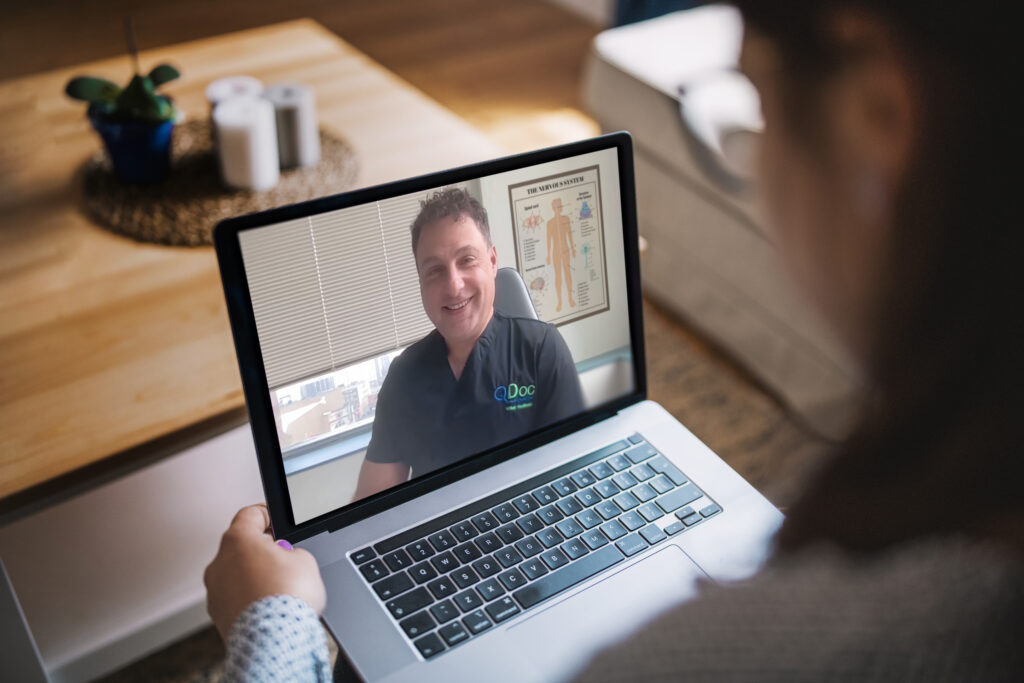Virtual medical service QDoc expands thanks to foundations built by RRC Polytech students
A virtual connection between a patient and doctor sounds simple in concept. In execution, though, it’s a challenge from both medical and technological perspectives.
In Manitoba, that’s where QDoc comes in. The local startup has created a solution that’s taken off in the mainstream since its launch last year. And with software development help from RRC Polytech students along the way, co-founders Dr. Norman Silver and David Berkowits believe they have a service that is not only winning awards now, but is also set for rapid expansion in the near future.
Launched in May 2022, QDoc is an online application that connects patients to doctors in real-time. Thanks to a custom algorithm, patients can log in and request to see a doctor. QDoc then sends a message to doctors informing them that a patient is there to be seen, and the two can meet in an encrypted online appointment at a time that fits within both schedules.
Today, 90 doctors across several specialties are on QDoc, including general practitioners, emergency doctors, pediatricians, obstetricians and ophthalmologists. Silver says that annualized, QDoc is set to see 50,000 patients use their system in Manitoba alone in 2023.
“We’ve had great feedback,” he says. “From the individual patient side, it’s unbelievable to have access like that.
“Patients who may have had to drive hours to see a doctor, with QDoc that really isn’t necessary. Doctors can talk through things that are maybe more labour-intensive where the patient may otherwise need to go in, but all factors considered — could be a snowstorm, could be the middle of the night, could be a young kid in the equation — that kind of stuff, it’s much better to try something at home first.”
It’s also a service that answers an obvious need in under-served communities, which Silver (shown above) and Berkowits have leaned into at every step of the process. QDoc is operating in select First Nations communities in rural Manitoba, and in lockstep with the Downtown Community Safety Partnership, they have provided tablets to Winnipeg’s most vulnerable so unsheltered people living downtown can virtually meet with doctors on QDoc for medical advice.
Programming of the QDoc application began in June 2021, and with tight timelines and many projects going at once, Silver and Berkowits reached out to existing partners at RRC Polytech to see if students would be available to assist on the software side.
Karen Kabel, Associate Dean of Creative Arts and Applied Computer Education at RRC Polytech, recalls her first meeting with Silver and how it set the path in motion to having students work on QDoc.
“I met Norm when he and his team were setting up the trailer on the Notre Dame Campus for COVID-19 testing — it was right as the pandemic hit and they needed space for testing as well as IT support,” says Kabel.
After running the testing site, Silver followed up to ask about the College’s ACE Project Space, an interactive workspace where students, entrepreneurs and other companies can collaborate to bring ideas to life. One of the outcomes of the ACE Project Space is to work with external industry clients to experiment with new ideas — which was the perfect fit for QDoc.
Students in the ACE Project Space led four projects for QDoc during its development, including building a scheduling assistant that created interconnections between the app and free time in doctor calendars, using optical character recognition (OCR) to automatically upload patient health cards directly into the application, and user testing of the online platform.
Kabel says the exciting technology in use at ACE Project Space lends itself perfectly to seeing how Manitobans will respond to a service like QDoc.
“We had a variety of people come into our user experience lab and go through a variety of tests of the application as customers and as medical professionals. The equipment shows where people struggle or have a good experience, through heat mapping and how eyes dilate while using the application.”
Berkowits, who was part of the team of in-house software designers working with students on development, was open-minded going into the collaboration and pleased with the results.
“It was new for us as a startup, and we had a lot of different projects we had to work in — many of them in parallel. So, at the time, ACE Project Space really worked well because it was easy for me to carve off a project that we were working on and have them be dedicated to it, manage it, and produce a final result. It’s great for companies that are starting up that need a proof of concept or a minimal viable product.”
Kabel agrees that this key differentiation of students leading a project, rather than joining staff and working within their structure, is one of the most rewarding aspects of being involved in the ACE Project Space.
“It’s as if they’ve been hired as a consultant. They’re the ones scheduling the meetings with QDoc staff, they’re the ones gathering requirements … as you watch the students from when they start, they grow as people, not just their technical and business skills, but they grow their confidence and how they present and talk to QDoc staff as individuals.”
Kabel says she has had students in the programs used by QDoc — which include Business Information Technology, Business Technology Management, and Information Security — return from a co-op and still look for that additional experience of working in the ACE Project Space because of the leadership benefits. She says the development projects have been an overall win for everyone involved.
“All the leaders within the College are very proud of our students and QDoc themselves. Dr. Silver and the team there have been great supporters of the College. He will come and speak with ambassadors from other countries and has always stepped up when we’ve needed help promoting our programs.”
Students have also joined the QDoc team as staff and will be key as the leadership team looks to expand in the months and years ahead.
“We want to expand in Manitoba and continue to grow here, creating more integrations and helping more people find the right care at the right time,” says Silver.

